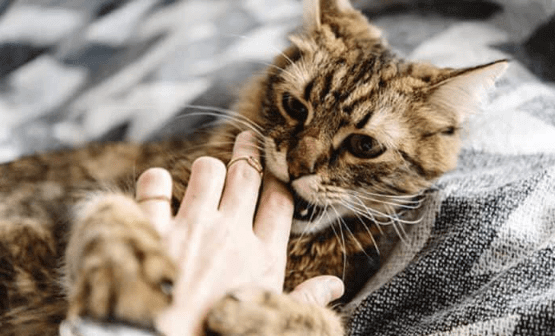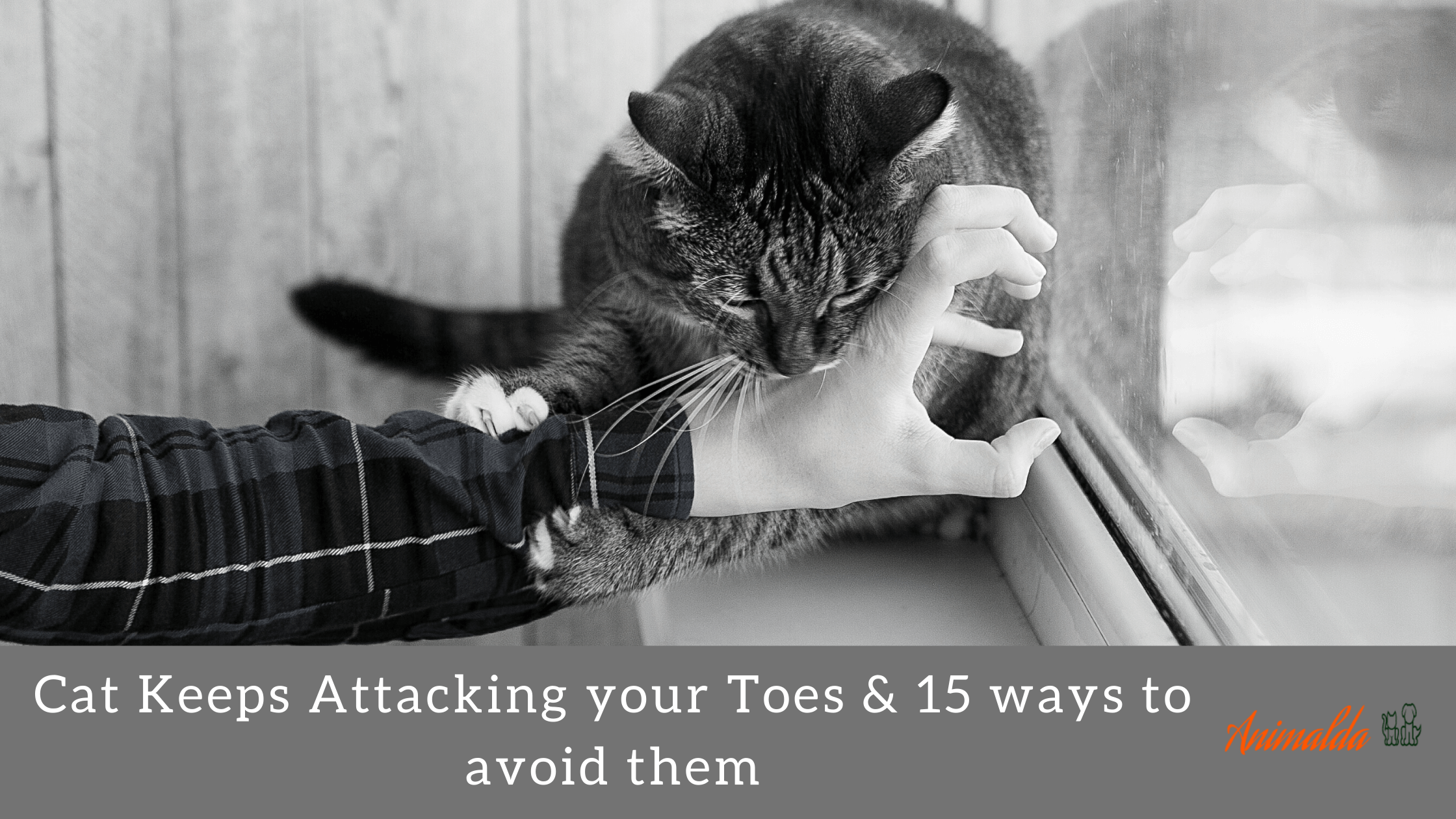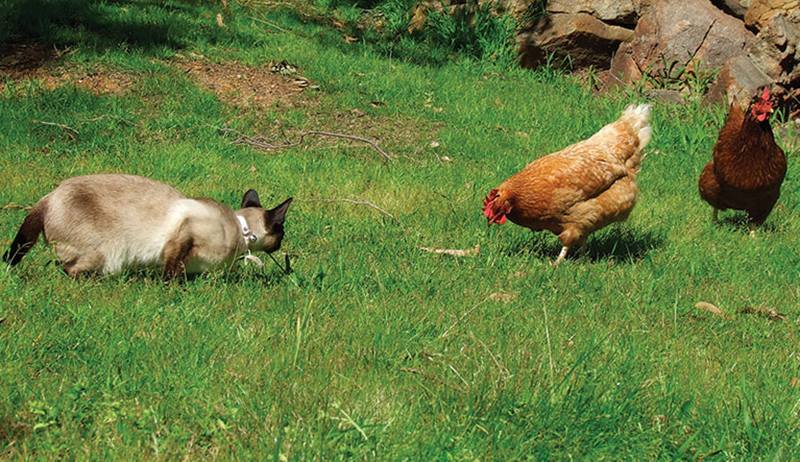New cat owners are often left baffled because their kittens keep attacking their feet, aiming for the toes. While it is cute and barely a scratch when they are tiny little fluffy kittens, it can get lethal as your young kitten grows up.
Many owners opt towards declawing, but most of us do not want to make our pets go through that operation.
To stop your cat from attacking your feet, you must first understand why they do it.
So, I hope to answer some common queries and offer solutions to help you get along with your little buddy.
Why Do Cats Love Bite?

Cats are playful creatures with the habit of pouncing. Usually, a sweet bite from your cat may indicate that he wants to play.
But you can differentiate between a playful love bite and real aggression. Sometimes, they are just overstimulated.
Aggressive play biting behavior can be detected by body language, and by noting if your cat is growling or hissing, or if the sound is more along the lines of purring.
Now, let us explore in-depth the various cat behavior reasons & why they aim for our toes.
- Hunting Instinct
Cats are born hunters and have a prey drive. And even though they have evolved over the centuries and become domesticated, they still have the hunter’s instinct.
They retain their sharp claws and teeth, which can have rough aftereffects on whoever gets in a tiff with them. In addition to that, they have held onto their instinct to chase and pounce on small moving objects.
And our feet fit the bill to be their plaything. Moving feet are dummy targets for house cats and during active playtime to simulate a hunting experience at home, and it is an excellent way for them to bond with their human.
Most indoor cats that do not have a stimulating the environment are seen to exhibit this cat aggressive behavior more.
- Play Time
As I mentioned before, a moving target is rough play and more enticing for an active kitten.
Your cat enjoys chasing your toes as much as he enjoys the laser pointer game. Cats who hunt feet are usually bored and are getting little time and attention to playing.
These sorts of play aggression or playful love bites and scratches are not dangerous and do not penetrate your skin. Your cat simply wants your attention and wants to be entertained in the process.
So if your kitten baby is giving you random love bites, you gotta give her a cheek rub and some love right now!
- Marking Their Territory
Cats love to mark their territory and especially their humans. It is essential for them to mark their locations and favorite objects and people with their distinct smell.
This is done when the cat rubs its body against it. Which explains why cats twist themselves around our ankles, start meowing and try to lick our toes when they really like us!
But why the feet? Because it is simply easier for them to reach. It is not easy for cats to reach any other body part of their human half, so they go for the easiest reach, feet!
You will notice that your cat mostly rubs up on your feet after you shower because they want you to have their scent stuck on you. Their mark needs to be refreshed frequently so they feel safe and you are known to them.
- Scared Kitty
Your cat can also love to bite your feet or toes in case they feel scared or they need your attention. In case they need food or water, they will scratch or love bite at your feet since it is easier to reach.
Your cat will likely love to bite your feet if they feel threatened by another animal or human invading their space. Cats tend to keep to themselves and if they exhibit this behavior with you, it means you are trusted.
Should I let my cat bite my toes?
It is usually unwise to let your kitten bite your toes or hands. It is neither healthy for the owner nor the cat. Of course, you get unwanted behavior such as scratches and love bites which can be a nuisance.
But it is proven that up to 75 percent of kitten bites can cause harmful bacteria to enter the body; including staphylococcus, streptococcus, and Pasteurella species.
Cat scratch fever, rooted in Bartonella henselae, may also spread through cat love bite and scratches. These love bites can often lead to infections and should be taken care of immediately.
You should immediately press on any cat love bite wounds and let the bacteria out with proper flushing with antibacterial washes before you rush to the doctor.
How to Make My Cat Stop Biting Me? (15 Ways You Can Stop Today)
If you want your little feline friend to stop biting your feet, you need to make life more exciting for your pal. This means, your cat needs to live in a physically engaging and challenging environment.
It is more fun to attack feet that do not want to be attacked than to play with the same piece of plastic kitty toys. But this sort of playful behavioural issue is correctable.
Kittens usually learn to love to bite and claw from their litter box and their mother. And if the kitten is separated from its mother too early, it may not learn the appropriate playtime etiquette. However, kittens also learn from their human counterparts.
So, we can play an important role in changing the kitten’s habits and raising it to learn appropriate playtime behavior.
Usually, it is not too hard to teach kittens the difference between good interactive playtime and bad play.
Here are some tried and tested ways to ensure your cat learns appropriate play behavior:
- Avoid letting your feline friend play with your hands or feet or any part of your body. This will validate their urge to swipe and pull at your fingers and toes. So, if you want to minimize the pouncing, enforce it with behavioral changes with acceptable play.
- Use sticks, fishing pole type of toys, or long strings to play with them. This keeps them at a distance from your body and gives them something to chase around.
- Buy chew toys or wrestling toys for your house tiger. Encourage them to have a rough play with the acceptable toys instead of your limbs.
- Cats may avoid wrestling with you if they have another cat in the house. Another cat would mean they can have more interactive playtime sessions.
- Whenever your cat exhibits any characteristic signs that he is in the mood to wrestle or play roughly, press the wrestling small stuffed toy to its belly and move away swiftly.
- DO NOT hit or yell at your cat if they pounce. It will develop a sense of fear in them which may cause them to avoid you.
- Make sure everyone in your house is aware of your cat’s training and how to respond to him. If all the family members do not treat him the same way, it can create a sense of confusion and ruin your cat’s training entirely.
- Arrange for appropriate, interactive toys such as wand toys for your cat or kitten to love bite and mess around with. Give your cat several options so that he does not get bored.
- Treat dispensing toys are a great way to encourage your cat to behave appropriately. The snacky incentive helps them practice normal behavior to receive their prize.
- Cats respond to positive reinforcements. Do not underestimate the power of your words. Encourage your cat when he is being soft with positive words and expressions, pets, and pats. E.g. “good girl, good paws” “good mouth, nice kisses”
- Adversely, you should exhibit your sadness or displeasure when your cat claws or bites you. Pull away playfully and stop the games as another cat would, with noises of displeasure or hissing.
- If your cat love bites you and refuses to let go, push your hand and arm into your cat’s mouth. This motion will encourage your cat to let go, whereas pulling away will encourage them to keep pulling as well.
- Train your cat to avoid playing with your clothes, since he will not understand the difference between clawing your bare leg and your clothed leg.
- Try to use replacement behavior training techniques with your cat. Reward your cat when he is behaving the way you intend it. For example, if your cat tends to scratch your ankles before you leave for work; teach him to sit and reward him with a treat. You can also use clickers to associate good normal behavior and treats with the clicking noise.
- Do not inflict physical punishment on your cat as it will result in them becoming more aggressive behaviour and more likely to fight back.





Very good article! We are linking to this particularly great article on our website. Keep up the good writing.